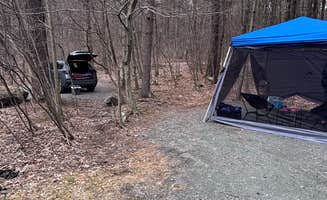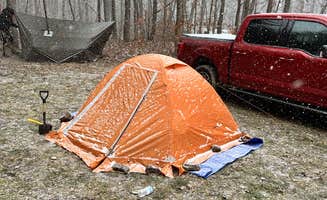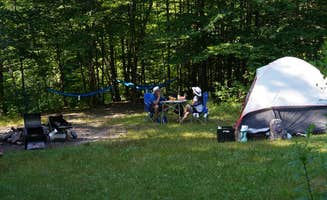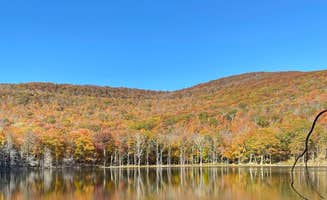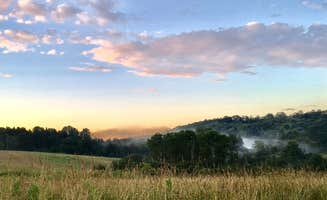Dispersed camping near New Kingston, New York offers primitive sites scattered throughout the eastern Catskill Mountains at elevations ranging from 1,500 to 2,500 feet. The region features numerous small streams and ponds within state forest lands, with camping opportunities typically located on unmarked forest roads. Most sites experience temperatures ranging from 75-85°F in summer to below freezing in winter, with higher precipitation in spring and fall.
What to do
Streamside exploration: Campers at Betty Brook Camp enjoy direct access to water activities. As camper Robert notes, "You camp on the stream. There is a couple of spots," making it ideal for creek wading, small-scale fishing, or simply enjoying the ambient sound of running water.
Hiking to backcountry sites: For those seeking more solitude, hike-in options provide greater seclusion. At Echo Lake, camper James shares, "Lake is surrounded by hills and there is a small lean two with a few campfire spots. Other campsites are scattered and require navigating through small overgrown trails (wear pants)." Bring proper footwear and long pants to navigate these less-maintained pathways.
Bird and wildlife observation: The region's mixed hardwood forests support diverse wildlife. Early mornings at the smaller water bodies like Duck Pond provide opportunities to spot various woodland birds, deer, and occasionally black bears from a safe distance.
What campers like
Quiet weekday experiences: The more remote sites offer true solitude, especially mid-week. One camper at Betty Brook Camp mentions, "Love to camp here all year long have been coming to the area for a couple of decades now. Remote. Sometimes you never see anyone. Sometimes you see some people."
Lake view camping spots: Higher elevation sites provide expansive views. At Echo Lake, James found an optimal spot: "We camped on the hill with a beautiful view of the whole lake and breeze," offering both scenery and natural cooling during warmer months.
Well-maintained primitive sites: Despite the remote nature, some sites remain surprisingly well-kept. At Duck Pond Campsite, camper Yae discovered: "After driving unpaved dirt road for a while, we arrived at surprisingly well maintained beautiful campsites. The pond is small so the mosquitos were not too bad."
What you should know
Road condition challenges: Access to many sites requires navigating unpaved forest roads. A Duck Pond camper warns about specific access points: "The road in on old cemetery rd was pretty rough, so we decided to go out the other way, which was way worse... Intermittent cell service which was frightening while driving on these rough roads."
Seasonal accessibility: Winter access varies significantly by site. At Beals Pond State Forest, Joshua notes: "This state forest is beautiful but not easily accessible in the winter. After a certain point, the road is not maintained in the winter and I was unable to get cell reception with Verizon."
Site arrival timing: Popular locations fill quickly, especially on weekends. One Echo Lake visitor cautions: "It does get a little crowded later in the day so you may have to share space with others and it can be a little noisy at night."
Tips for camping with families
Lean-to options for easier setup: Families with young children may appreciate the lean-to structures available at select sites. At Denning Trailhead Peekamoose Primitive Camping, Ali mentions, "near the top of tabletop there is also a lean-to for camping," which can simplify setup and provide more shelter.
Stream-adjacent sites: Children often enjoy playing near shallow water features. Select sites with gentle stream access for supervised water play, but be aware most lack formal swimming areas.
Proximity to emergency services: The remote nature of dispersed camping means limited cell service and considerable distance from medical facilities. Families should plan accordingly with first aid supplies and emergency communications.
Tips from RVers
Size restrictions: Most dispersed sites near New Kingston accommodate only smaller rigs. A local camper at Betty Brook Camp advises: "I would not recommend this for large trailers. The site is fairly small, but it's in state park, and there's tons of walking that can be done."
Limited turning radius: Forest roads often lack adequate turn-around space for larger vehicles. Scout potential sites first without your trailer or consider smaller, more maneuverable rigs under 20 feet.
Leveling challenges: Prepare for uneven terrain at most sites. Bring adequate leveling blocks and stabilizers as most primitive sites lack the grading found at developed campgrounds.


